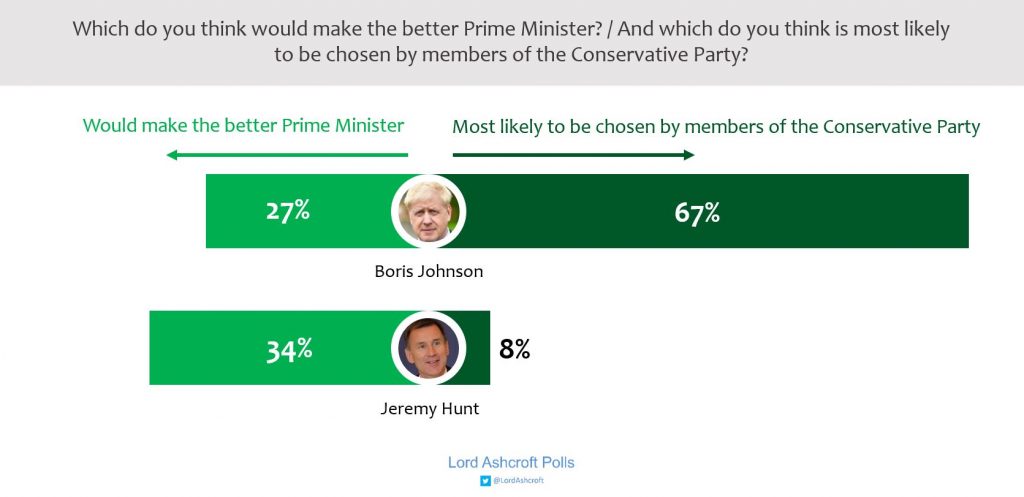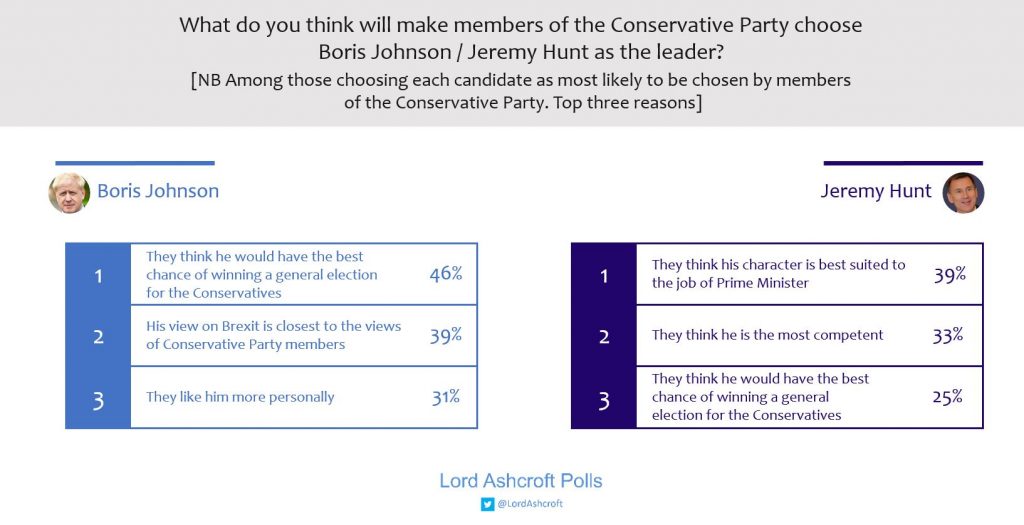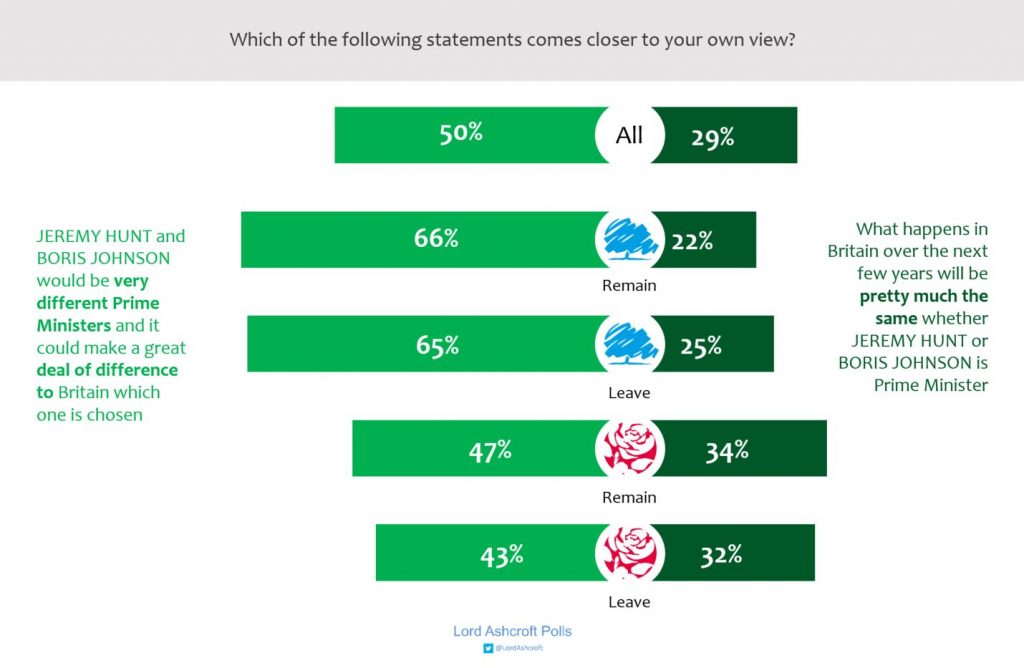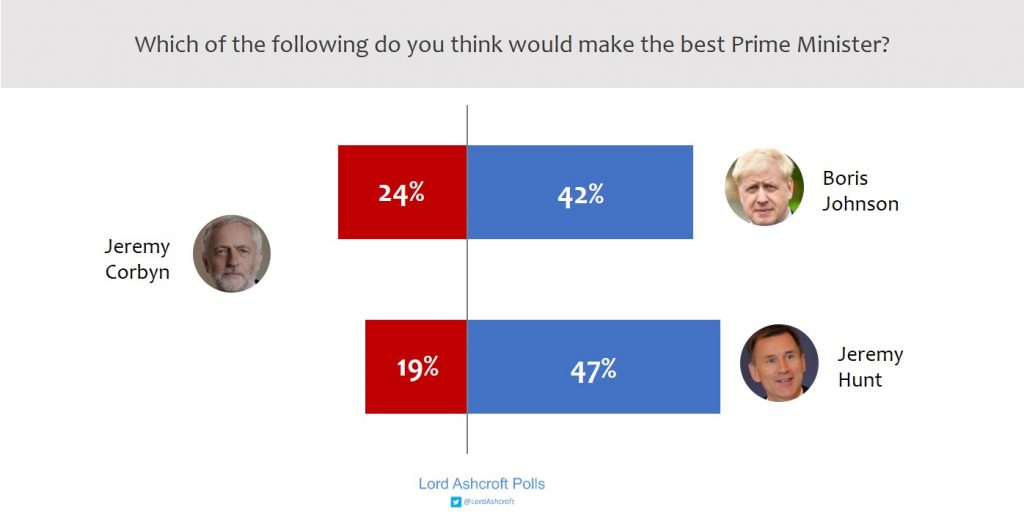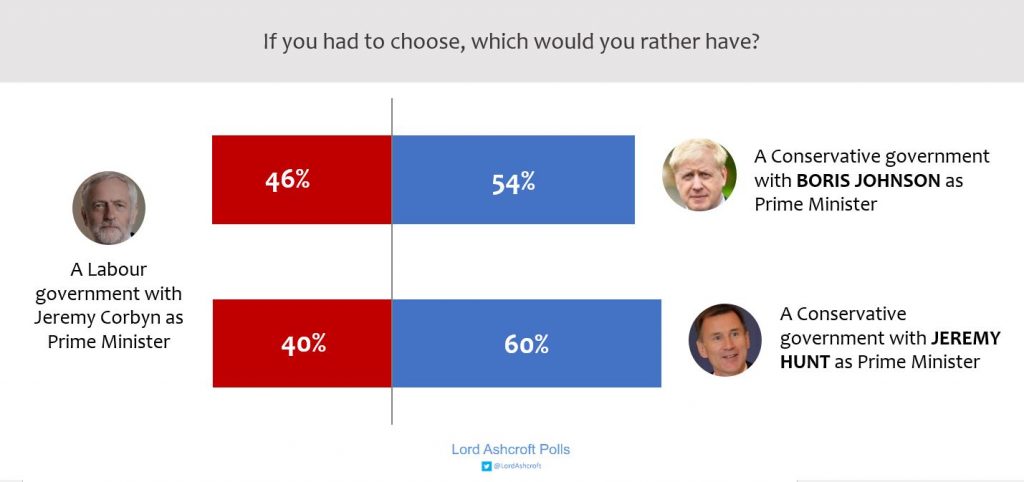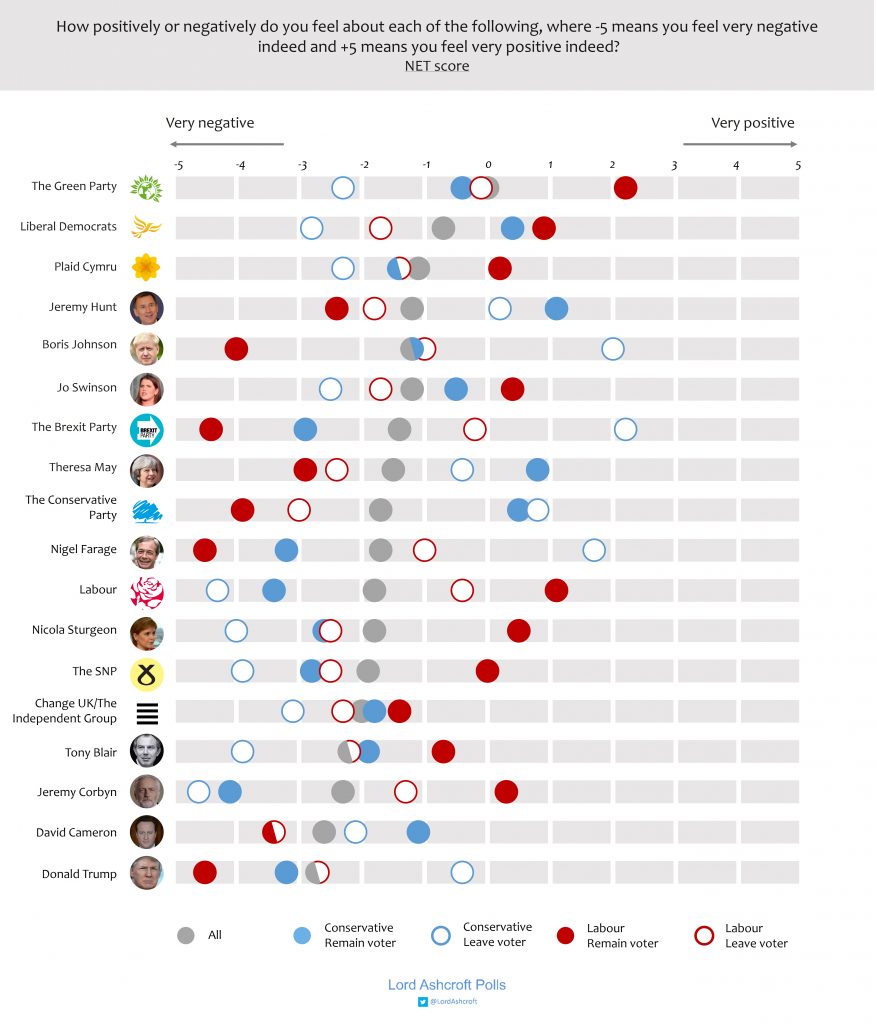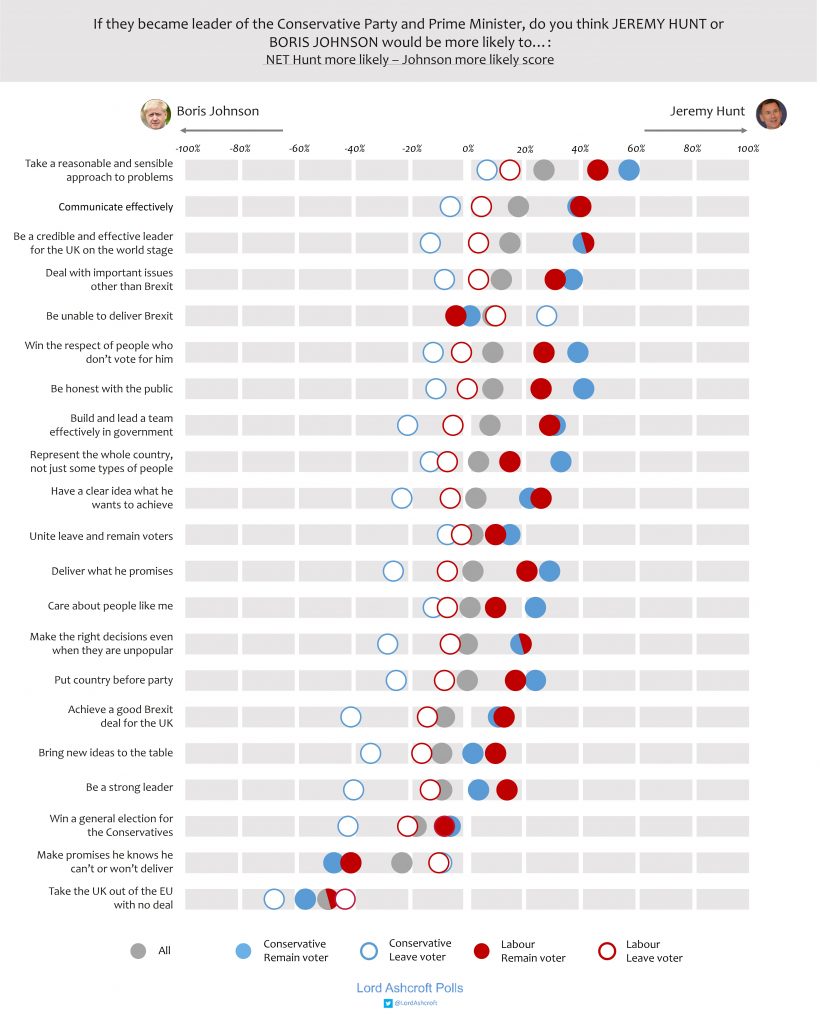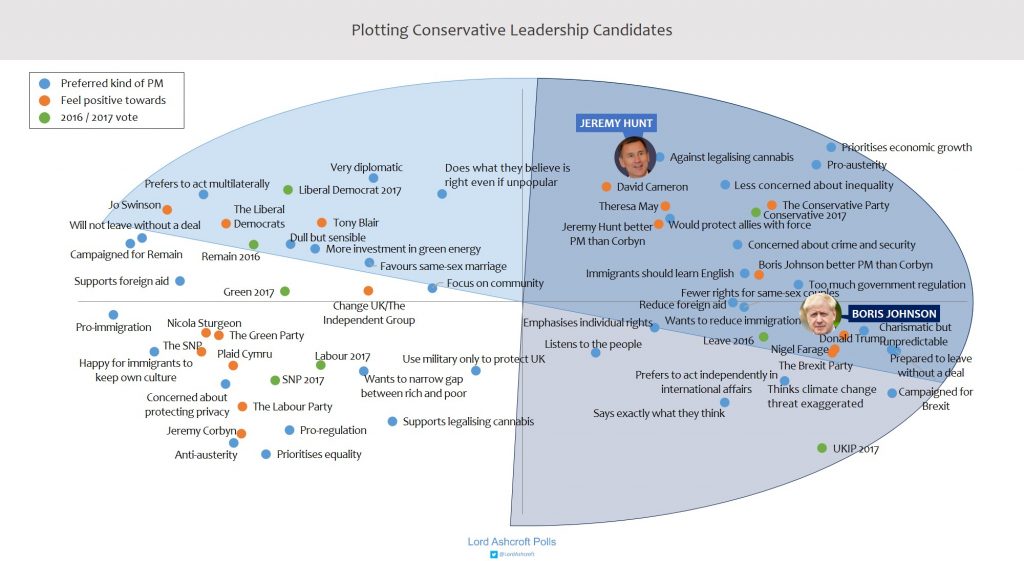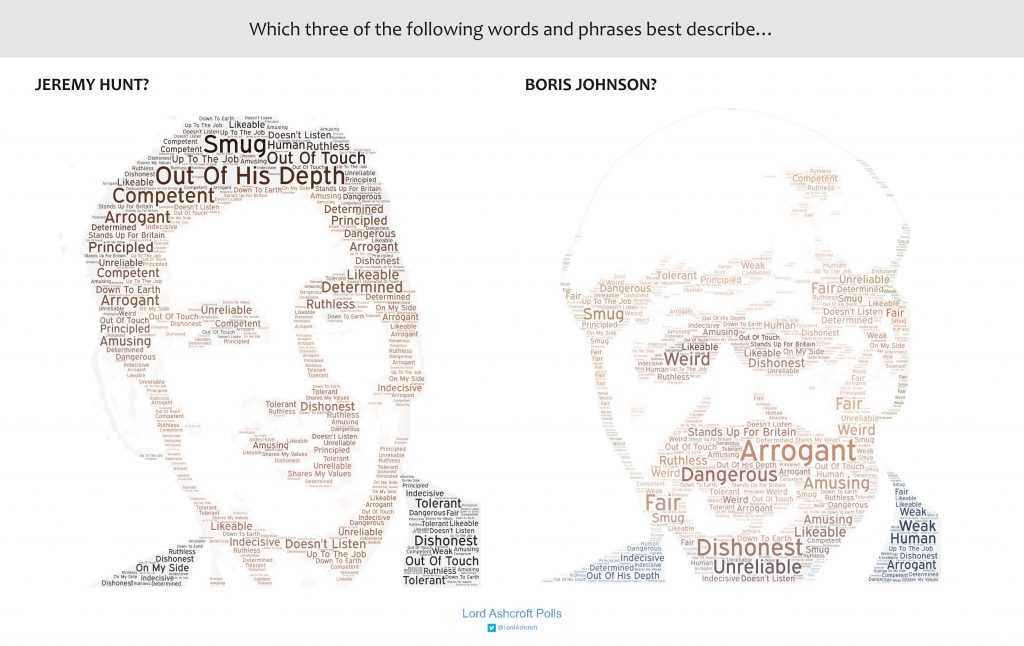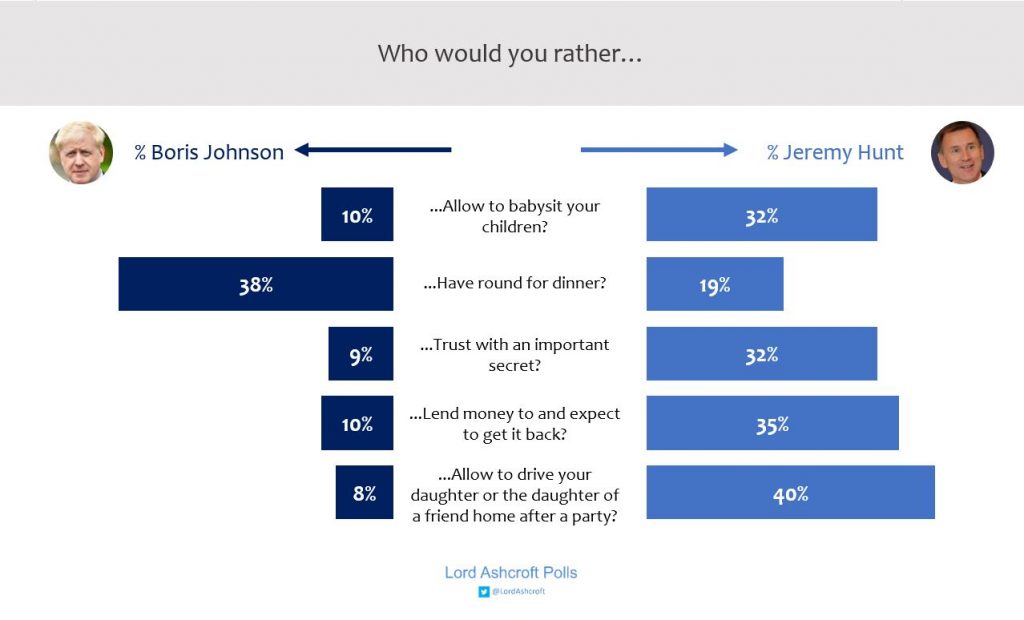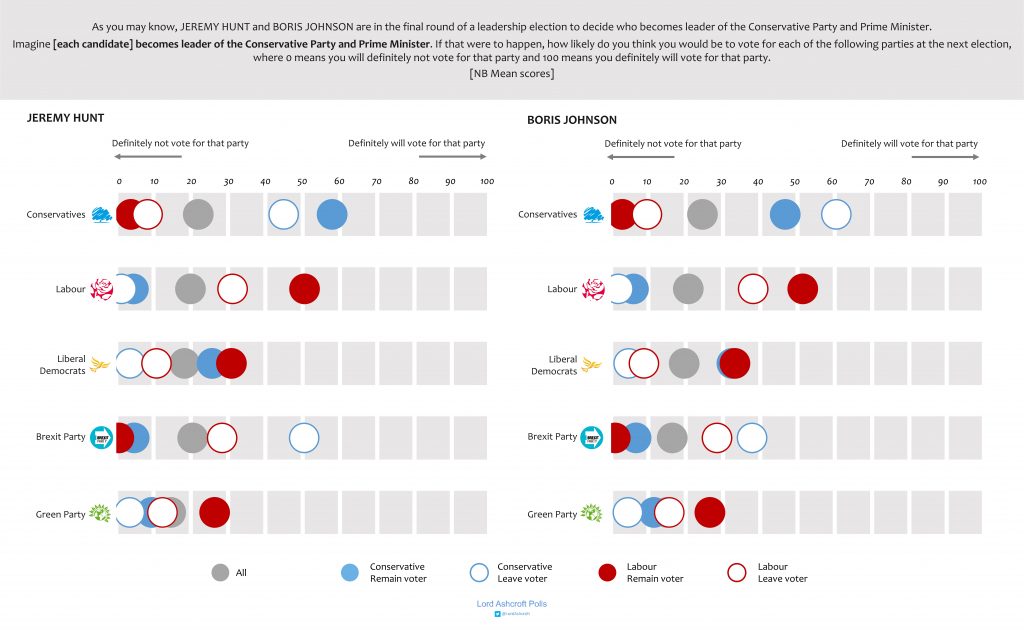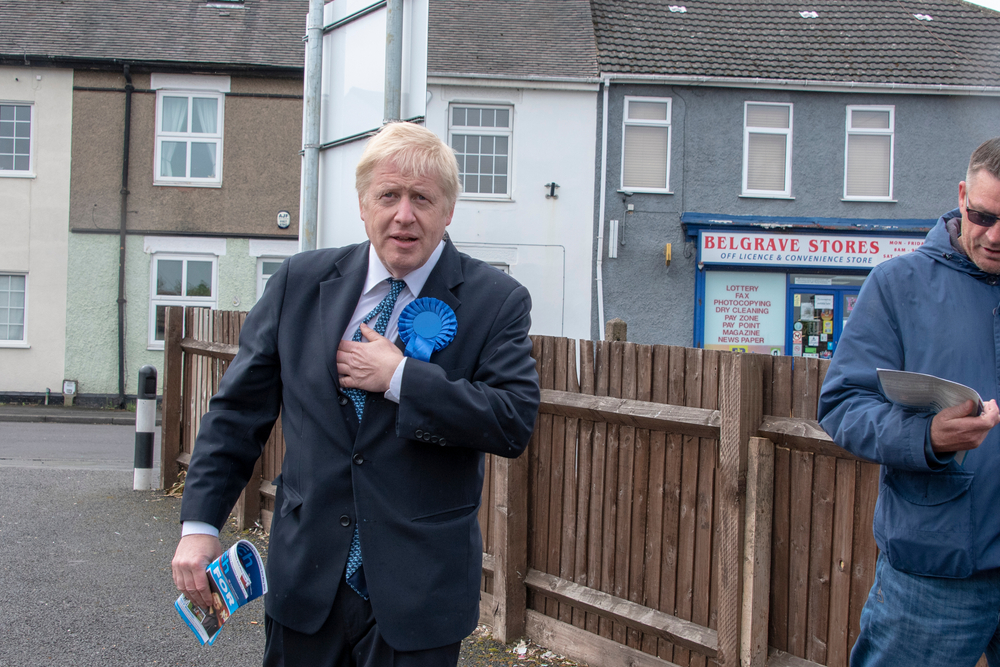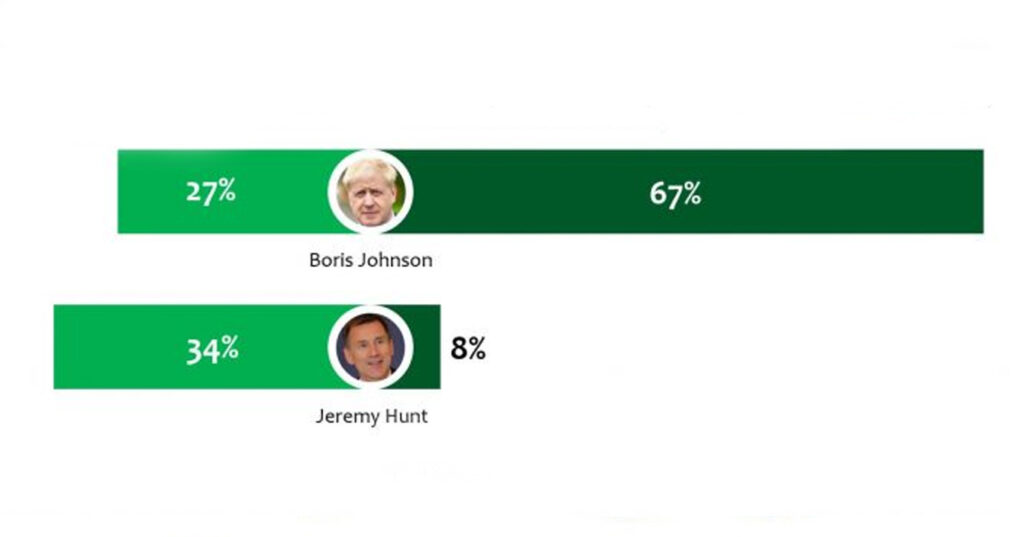
While Boris and Jeremy make their pitch to Conservatives around the country, I have been giving their tyres a good kicking. My latest poll of more than 8,000 people shows in detail what people make of the two candidates vying to be their next Prime Minister – particularly their appeal to voters who are not already Tories.
Who would be best – and who will win?
Asked which candidate would make the best PM, 34% of all voters said Jeremy Hunt, and 27% said Boris Johnson, with 39% saying they didn’t know. Remain voters overall prefer Hunt by a 45-point margin; Remainers who voted Conservative in 2017 do so by 57% to 19%.
2017 Conservative voters as a whole currently prefer Johnson by 47% to 29%. Tory Leavers do so by 58% to 19% – and Labour Leavers by 33% to 23%.
Though their preference is for Hunt, voters overwhelmingly expect Johnson to win the contest: 67% expect him to be chosen by party members, with just 8% anticipating a Hunt victory.
Why will the Tories choose as they do?
The few who expect Hunt to win the contest think Tories will choose him because is character is better suited to the job of Prime Minister, and that they regard him as the more competent candidate.
Those who think Johnson will win think Tories see him as their best chance of winning a general election, and that his view on Brexit is closest to that of Conservative Party members.
Does it matter?
We asked respondents whether they thought the two candidates “would be very different Prime Ministers and it could make a great deal of difference to Britain which one is chosen,” or if they thought “what happens in Britain over the next few years will be pretty much the same” whichever of them goes to Downing Street.
Voters as a whole agreed more with the first statement, and Conservatives – both Remainers and Leavers – were the most likely of all to do so.
Against Jeremy Corbyn
Voters as a whole said they thought both Jeremy Hunt and Boris Johnson would make better Prime Ministers than Jeremy Corbyn – Hunt by a 28-point margin (47% to 19%), and Johnson by 18 points (42% to 24%). While Conservative Leavers prefer both candidates by similarly high margins, Tory Remainers prefer Hunt over Corbyn by 83 points but Johnson over Corbyn by 56 points; one in three say ‘don’t know’ to that particular choice.
Remain voters as a whole prefer Hunt over Corbyn by 9 points, but Corbyn over Johnson by 20 points. Labour Leavers prefer both Hunt (by 5 points) and Johnson (by 9 points) to Jeremy Corbyn.
Forced to choose between a Conservative government led by Jeremy Hunt and a Labour government led by Jeremy Corbyn, voters as a whole plumped for a Hunt administration by a 20-point margin. A Johnson-led Tory government was more popular than a Corbyn Labour administration by the lower margin of 54% to 46%.
While Leave voters say they would prefer Conservative governments led by either candidate by 60-point margins, Remain voters as a whole prefer a Corbyn-led Labour government over a Hunt-led Tory government by 14 points, but a Corbyn-led Labour government over a Johnson-led Tory government by 40 points. Tory Remainers prefer a Johnson administration by 66 points, but a Hunt administration by 95% to 5%.
Asked how positively or negatively they felt about a number of politicians and parties, voters gave Hunt and Johnson identical average scores, higher than those of the Conservative Party as a whole and other political leaders. However, it was notable that while Hunt’s scores were clustered largely around the neutral centre, Johnson’s overall total was the result of a balance between the very positive and very negative ends of the scale.
Who could do what?
We asked whether certain things were more likely to be achieved by Jeremy Hunt or Boris Johnson, or were equally likely (or unlikely) to happen under either of them. Voters think Hunt would be more likely to be a credible and effective leader for Britain on the world stage, build and lead an effective team in government, deal with important issues other than Brexit, take a reasonable and sensible approach to problems, and win the respect of people who don’t vote for him.
Johnson is thought more likely to take Britain out of the EU with no deal, win a general election for the Conservatives, be a strong leader, and to make promises he knows he can’t or won’t deliver.
People were most likely to say that two candidates would be equally unable to achieve a good Brexit deal for the UK, be honest with the public, represent the whole country, unite Leave and Remain voters, make the right decisions even when they are unpopular, and care about “people like me.”
Reach v. grasp
To get a better understanding of the two candidates’ comparative appeal, we repeated a process used earlier in the year to assess the potential success of new parties(with, as subsequent events have proved, some prescience, if I say so myself). We showed people pairs of opposing statements that might describe a Prime Minister – personal characteristics and policy positions they might take – and asked how strongly they preferred one or the other in each case. These answers are plotted on the attitudinal map below – for example, those preferring a PM who supports austerity are in the top right, and those wanting an anti-austerity PM in the bottom left. Analysing these responses along with people’s past votes and how positively or negatively they felt towards parties and politicians allowed us to chart Hunt and Johnson’s support and potential reach.
The shaded areas represent what might be called the boundaries of the Hunt and anti-Hunt hemispheres, and the Boris and anti-Boris hemispheres – and show where they overlap and where they do not. Both candidates are within what might be called the Conservative quadrant of the map: those who take a positive view of either candidate are also likely to take traditional centre-right positions on, for example, economic policy, austerity and crime. Even so, they clearly occupy distinct positions.
While Johnson is closer to those who want a PM who listens to the people and does what they want, Hunt is closer to those who want a leader who does what they think is right even if it is unpopular. Hunt’s hemisphere includes those who prefer a PM who is very diplomatic and prefers to act multilaterally, but Johnson’s takes in those who want a leader who says exactly what he thinks and prefers to act independently in international affairs. While Johnson is in reach of those who voted UKIP in 2017, Liberal Democrats are in the same hemisphere as Hunt.
In 2017, Labour and the Conservatives between them accounted for 82% of the vote. As things stand, this looks unlikely to happen again. The winner, then, will be the party whose 2017 voting coalition unravels the least. In terms of the attitudinal map, the Tories cannot afford to be confined to a single quadrant in the top right, just as Labour need to avoid appealing exclusively to the bottom left. The question is whether Hunt or Johnson is more likely to succeed in turning their theoretical reach into general election votes.
Portrait of a candidate
We offered respondents a selection of 25 positive and negative words and phrases and asked them to choose those that they thought best described the two candidates. For Jeremy Hunt, the top five overall choices were, in order, “smug,” “out of his depth,” “competent,” “out of touch” and “arrogant.” The five most often chosen for Boris Johnson were “arrogant,” “dishonest,” “dangerous,” “unreliable” and “amusing.”
Among 2017 Conservative voters, the top choice for Jeremy Hunt was “competent”. For Boris Johnson it was “stands up for Britain.”
Voters as a whole, and especially Leave voters, said they would rather have Johnson round for dinner (though Hunt was the more popular invitee among Remainers). But by very wide margins, all groups – including Conservative Leavers – said they would rather allow Hunt to babysit their children, trust him with an important secret, lend him money in the expectation of getting it back, and (especially) let him drive their daughter or the daughter of a friend home from a party.
The next general election
We asked half our sample how likely they currently thought they were on a 100-point scale to vote for each party at the next election if Jeremy Hunt were Prime Minister, and the other half the same question if Boris Johnson was in Number Ten.
On average, 2017 Conservative voters who voted Leave in the referendum put their chance of voting for the Brexit Party at 50.4/100 if Hunt were PM, higher than their chance of voting Tory again (44.9). Under PM Johnson, they put their likelihood of voting Conservative at 60.4, and the Brexit Party at 37.8.
Conservative Remain voters put their chance of voting Tory again higher under Jeremy Hunt (57.9) than under Boris Johnson (46.7), and their likelihood of voting Liberal Democrat higher with Johnson as PM (32.4) than with Hunt (25.4). The Brexit Party’s overall mean score put it second to the Conservatives with Jeremy Hunt as PM, with Labour third and the Lib Dems fourth. Under Boris Johnson, the Brexit Party were fourth, with Labour second and the Lib Dems third.
